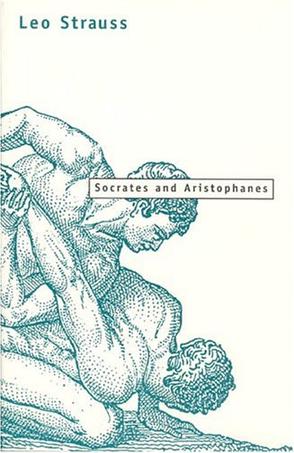
内容简介
In one of his last books, Socrates and Aristophanes, Leo Strauss's examines the confrontation between Socrates and Aristophanes in Aristophanes' comedies. Looking at eleven plays, Strauss shows that this confrontation is essentially one between poetry and philosophy, and that poetry emerges as an autonomous wisdom capable of rivaling philosophy. Summary: How the other half lives This book follows the typical Strauss pattern: In the first few pages he makes a blanket statement (in this case, Aristophanes is a reactionary; in Thoughts on Machiavelli it was, Machiavelli is evil), then follows it up will a torturous and nuanced analysis of the thinker's ideas until you begin to wonder: In what way is Aristophanes a reactionary or Machiavelli, evil. He tells you the picture is black and white, then he brings you in so close that it all turns gray. Be this as it may, Plato's Symposium and Republic (especially Republic X where Socrates bans the poets from his just city) tells only half the story (philosophy's side). In this book Strauss tells the other half (poetry's side). In essence, Symposium and Republic (and to a certain extent, Phaedo) make up Plato's case as to why philosophy should be the teacher of public morality instead of poetry. Strauss' book takes Aristophanes' eleven existing plays and presents his opposing arguments, his defence of poetry and attack on philosophy. Interesting read for we who sit the other side of Plato's Republic (i.e. Medieval Christendom, where there is no longer any contest between Thomas Aquinas and Dante Aligheri). Summary: The madness of war While the introduction, conclusion and first essay (on "Clouds") is apparently anchored in an argument between philosophy and poetry, the further Strauss leaves "Clouds" behind, the more we see through his close reading of the plays, in a way we never do from the younger Plato, the cultural disintegration of Athens under the assault of the war. Euripides, not Socrates, emerges at the real opponent and comedy triumphs over both tragedy and philosophy as the best teacher. This brings us close to an historical experience so often lost in classical studies, particularly in political philosphy, the madness in the streets of Athens and the fully-formed, transcendent characters which emerge with the comic treatment. These are not the spoiled aristocratic youth clustered around Socrates or the sophists (Plato's real enemies - not the poets). These are the men and women at the corner bar. This book makes you wish Strauss had done a "Hobbes and Shakespeare." His evident enjoyment of his subject leaks through with increasing intensity the further he seems to drift from his dichotomy. Could it be Strauss wished to remind his followers, ever so gently, to, like, lighten up and read a good comedy, even in the Greek some labor so hard to acquire? The book at least raises two questions: how did the bold Aristophanes avoid capital punishment? why did the ironic, diplomatic Socrates accept his? Summary: insightful...helpful I had to write a term paper for my critical thinking class in college, and it was on Aristophanes. The topic, more specifically, explored how Socrates' fate would have been different, had Aristophanes not written the play "The Clouds." This book was helpful in explaining the play, Aristophanes, and his relationship with Socrates. If you're studying anyhting of this nature, or are just interested in the two men mentioned in the title, I strongly recommend that you read it.
下载说明
1、Socrates and Aristophanes是作者Leo Strauss创作的原创作品,下载链接均为网友上传的网盘链接!
2、相识电子书提供优质免费的txt、pdf等下载链接,所有电子书均为完整版!
下载链接
热门推荐
- 1 独腿旅行者
- 2 人间正道
- 3 野兽必死
- 4 森林中有许多酒
- 5 鲁迅传
- 6 动物园长夫人
- 7 不再努力成为另一个人
- 8 热爱生活的一万个理由
- 9 专家的窘境
- 10 艺术的旅程
